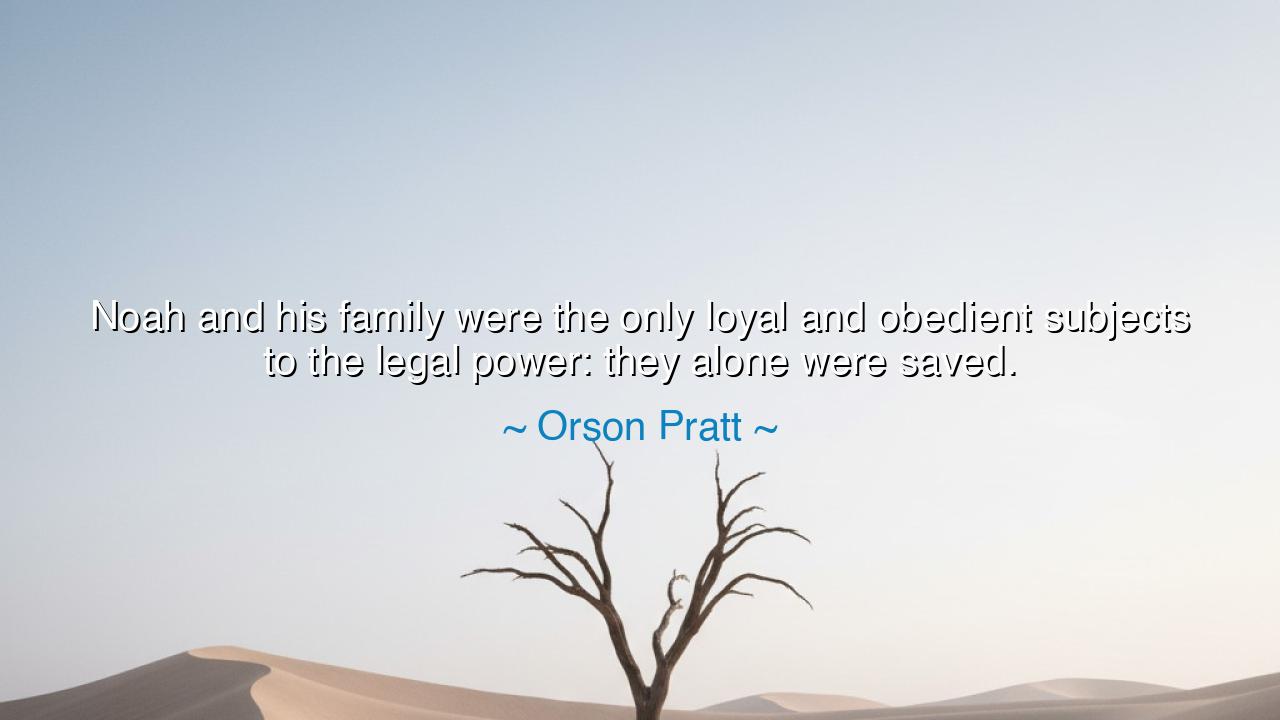
Noah and his family were the only loyal and obedient subjects to
Noah and his family were the only loyal and obedient subjects to the legal power: they alone were saved.






In the words of Orson Pratt: “Noah and his family were the only loyal and obedient subjects to the legal power: they alone were saved.” These words echo from the ancient flood story itself, a tale as old as humanity’s struggle between corruption and obedience, destruction and redemption. Pratt reminds us that salvation is not given to the many who scoff at law and order, but to the few who bow with humility before the divine and just command. His phrasing—“legal power”—casts God’s will as more than faith; it is the binding law of creation itself, a law that none can break without consequence.
The story of Noah is carved deeply into the memory of nations. When the world had grown violent, when injustice and cruelty spread like a plague across the earth, the voice of heaven declared judgment. Yet among the multitudes, only Noah and his house remained faithful. They obeyed not with grumbling, but with diligence. They built the ark, mocked by neighbors and despised by their generation, yet steadfast. When the waters rose, it was not wealth, nor status, nor pride that saved them—it was obedience to the legal power that governs all creation.
The ancients often taught that law is not only of men, but of the cosmos. The Stoics spoke of the Logos, a divine order binding the stars and mankind alike. To live against this order was to invite ruin; to live in harmony was to share in eternity. Pratt’s words align with this timeless truth: that Noah’s obedience was not mere servility, but alignment with the eternal order of justice and truth. To disregard such order is to build one’s house upon sand, doomed to collapse when the storms arrive.
Consider also the story of Socrates. Though unjustly condemned by Athens, he chose not to flee but to accept the hemlock, declaring that he must honor the laws of the city, even when those laws erred against him. Like Noah, he understood that to respect the higher authority of law, whether divine or civic, is to preserve one’s soul from corruption. The many mocked and scorned him, just as Noah was mocked, but the few who saw clearly knew that obedience to higher order is the path of true freedom.
The deeper meaning of Pratt’s words is that loyalty and obedience, when directed toward righteousness, are the foundation of survival—not merely physical survival, as in the ark, but spiritual endurance through the floods of life. It is easy to follow the crowd, to revel in lawlessness when the masses celebrate it. But the story of Noah is eternal: the crowd may seem strong, but it is the faithful few who are saved. For the legal power is not swayed by numbers—it is eternal and unmoving, rewarding those who remain steadfast.
And yet, Pratt does not speak of blind obedience to tyranny, but of loyalty to divine law and just order. The “legal power” in his words is the moral foundation upon which true governance rests. To mistake corruption for law is to misunderstand. Noah’s loyalty was not to the voices of his age, but to the eternal decree of heaven. Likewise, each generation must discern whether its laws align with justice. Those who stand firm, even against ridicule, may one day find themselves, like Noah, lifted above the waters of ruin.
So let this teaching endure: when the world mocks obedience and glorifies rebellion, remember Noah. Remember that loyalty to truth and obedience to just law may set you apart, but it is better to be mocked in righteousness than drowned in corruption. In your own life, do not despise the commands of conscience and the eternal order. Build your ark—whether of faith, of virtue, or of integrity—though others laugh. For when the storms come, as they always do, it is the faithful who endure, and the loyal who are saved.






AAdministratorAdministrator
Welcome, honored guests. Please leave a comment, we will respond soon